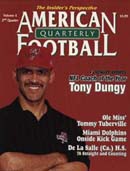Article CategoriesAFM Magazine
|
NFL Coach of the YearTampa Bay's Tony Dungyby: Scott Smith AFM Staff Writer © More from this issue Picture Sir Edmund Hillary, circa 1953. How might he have felt, standing atop Mount Everest for the first time, if some anonymous Sherpa guide suddenly tapped him on the shoulder and said, "Nice job on this Everest thing and all but, uh, have you seen the really big one behind you?" Tony Dungy might know that feeling. Having just scaled his own Everest in '96 as he finally landed the NFL head coaching job that had eluded him for 10 years, Dungy was presented with this Tibetan-sized task: take the least successful team in modern league history, the Tampa Bay Buccaneers, and turn them into a Super Bowl contender. Dungy had a new six-year contract and no unrealistic time constraints for this turnaround, but it was the kind of task that could loom over a man, mountainously. It is a measure of his coaching abilities that he ....The full article can only be seen by subscribers.
|
|
|||||||
| HOME |
MAGAZINE |
SUBSCRIBE | ONLINE COLUMNISTS | COACHING VIDEOS |
Copyright 2025, AmericanFootballMonthly.com
All Rights Reserved





